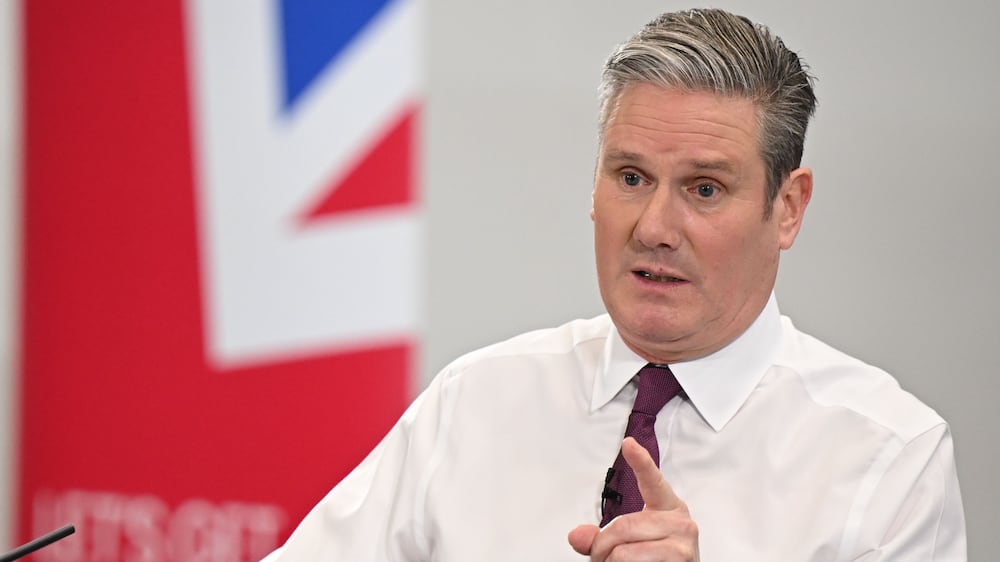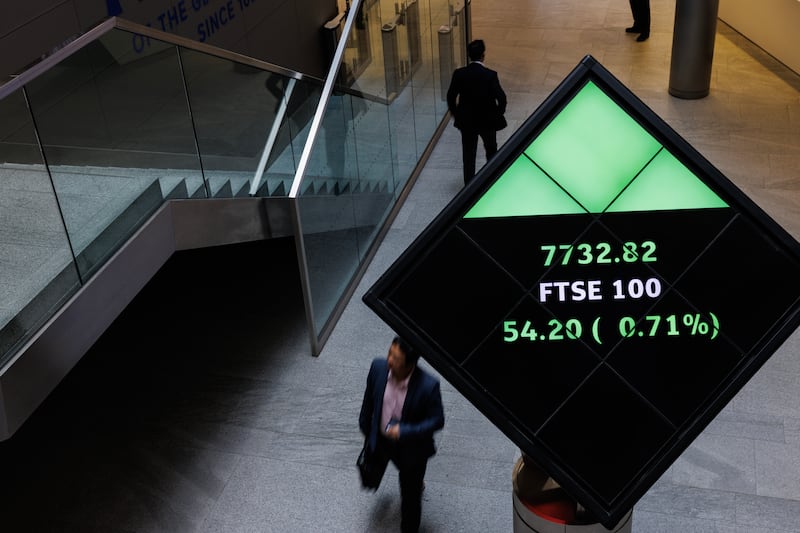The UK stock market did an astonishing thing last week: It shrugged off the country’s economic and political malaise and sparked into life.
London’s FTSE 100 index jumped 1.9 per cent on Thursday, its biggest one-day increase of the year.
It edged up another 0.61 per cent on Friday to close at 7,930.92, the highest in about year and a whisker away from breaking through the 8,000 barrier for only the second time in its history.
The last time it did that was in February last year, but it was unable to sustain those heady heights for long.
The UK’s blue-chip index has not suddenly turned into the S&P 500, but last week's revival was sorely-needed relief for a market that has been abandoned by its own investors.
So, what is going on?
Two decades ago, UK shares made up roughly 8 per cent of the global total. That has now shrunk to a 3.5 per cent.
To a degree, this is inevitable. The rise of emerging markets and US tech dominance made sure of that.
Yet it is a further sign – if one was needed – of the country’s waning power and influence.
Brexit cannot be blamed for all of the UK’s problems, but it has not helped, says Tom Stevenson, investment director at Fidelity International.
Before the country voted to leave the European Union, the UK market matched the US blow for blow. Since then, it is been knocked out of the ring.
Mr Stevenson calculates that $100 invested in the S&P 500 the day after the Brexit referendum would be worth $281 today with all dividends reinvested.
By contrast, the FTSE 250 index, the most domestic UK index, returned only $140.
“In other words, US stock market returns have been more than four times greater,” he says.
This is slightly unfair as no other market has been able to keep pace with the US, which has been turbo charged by the Magnificent Seven tech stocks.
The UK is full of “old school” companies in the energy, financial, mining and tobacco sectors, which have generally fallen out of favour.
There are also technical reasons for the underperformance, as legal and regulatory changes have pushed the country’s pension funds into putting more than two thirds of their wealth into low-risk bonds.
“Before 2000, 70 per cent was invested in shares, with a high weighting to UK stocks,” Mr Stevenson says.
British Chancellor Jeremy Hunt is now looking to reverse that while lining up new tax incentives to encourage UK private investors buy British shares.
Mr Hunt has a long way to go to revive the UK’s fortunes, but the FTSE does have one factor on its side.
After being snubbed for the best part of a decade, it is now one of the cheapest stock markets in the world.
While the US trades at more than 20 times forecast earnings, the UK is valued at slightly more than 10 times.
“One market is frothy, perhaps in the early stages of a bubble. The other is undeniably cheap,” Mr Stevenson says.
US private equity funds already know this and have been launching one raid after another on cheap UK strugglers.
Now, the rest of the world is starting to wake up to the opportunity, too.
Last week’s rally was largely triggered by hopes that the Bank of England was moving a step closer to cutting interest rates, currently at a 16-year high of 5.25 per cent.
This followed a sharper-than-expected drop in the consumer price inflation rate in February, from 4 per cent to 3.4 per cent.
Of course, lower borrowing costs are expected to boost every stock market, but the UK has one more surprising advantage.
While democracy is wilting under the populist assault, Britons are in a different position. They have had 14 years of Conservative rule and in the country’s two-party system, unhappy voters are swinging to the Labour Party by default.
Labour leader Sir Keir Starmer is nobody’s idea of a left-wing firebrand, while UK history suggests a change of government is good for stock markets.
In the 16 elections since 1962, the FTSE All-Share Index has recorded a double-digit percentage gain in the first year after a new prime minister ousted an old one in an election.
Laith Khalaf, head of investment analysis at AJ Bell, says UK shares have one more advantage.
They are not just cheap, but pay some of the most generous dividends in the world, with the FTSE 100 forecast to yield 4.2 per cent this year, roughly double the US.
Some stocks yield a lot more. For example, Lloyds Banking Group yields 5.29 per cent, house builder Taylor Wimpey yields 6.81 per cent and insurer Phoenix Group Holdings yields a mighty 9.6 per cent.
While sky-high dividends like this one can be vulnerable to a cut, on Friday, Phoenix increased its payout by 2.5 per cent after reporting a 13 per cent jump in full-year operating profits to £617 million ($777.9 million).
Phoenix is now the second-most bought UK share among AJ Bell customers, just behind another high-yielding insurer, Legal & General Group.
Other popular UK stocks on the platform include Aviva, British American Tobacco, wealth manager M&G and Barclays, all of which pay a generous income to investors.
For those ready invest in a UK recovery, the simplest, cheapest option is to buy a low-cost exchange-traded fund, such as the iShares Core FTSE 100 ETF or Vanguard FTSE 100 ETF.
However, the FTSE 100 is an international index, where companies generate more than three quarters of their revenue overseas.
Those who want exposure to a UK recovery may prefer, say, the Vanguard FTSE 250 ETF, which contains medium-sized companies with a larger domestic focus.
For those who want active fund management, Mr Khalaf says one option is to invest in the City of London Investment Trust, which focuses on dividends, and Fidelity Special Values, which invests in “unloved or overlooked UK companies that may be set to stage a recovery”.
Watch: UK opposition leader Sir Keir Starmer says he is ready for an election
UK opposition leader Sir Keir Starmer says he is ready for an election

Brave investors could even take a punt on smaller companies, which are cheap after recent volatility, Mr Khalaf adds.
“Over the last 20 years, the average UK smaller companies fund returned 360 per cent compared to 239 per cent for the average UK fund. WS Amati UK Smaller Companies is an option.”
Naturally, there is a danger that last week's rally will prove to be yet another false dawn for UK shares. We have seen plenty of those.
Yet, international investors who fear the US technology rally has gone too far may want to take a second look at the UK.
Holding about 3.5 per cent of their portfolio in FTSE shares sounds about right. Or maybe a little more.






